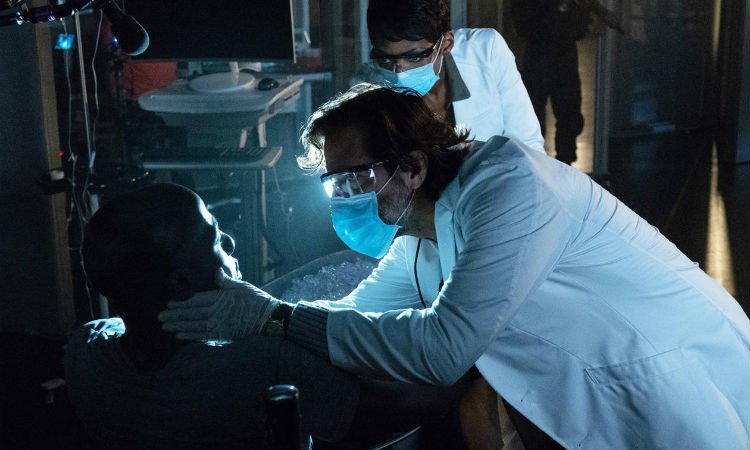
“All you have to do is give in. Fighting only makes it harder.”
One more week and another step closer to the inevitable end of society as we (in the world of The Passage at least) know it. As the effect of the serum begins to elevate Amy’s own physical capabilities, the one other light of hope steps into the darkness as Anthony Carter makes his choice.

As it has been with the previous two weeks, “Whose Blood Is That?” tells the origin story of another viral, this time it’s Anthony Carter. Similar in many ways to Babcock’s own tragic story, Carter’s situation was not one of his own doing. However, where Babcock was actually guilty of murdering her parents (though not the right thing to do, understandable considering the vile people they were), Carter was nothing of the sort. Instead, his unintended affair with a damaged, depressed, drug-addict Rachel Wilson that ended with her suicide, an event that he blames himself for enabling, causes him to drift into his own personal hell. Whether reality aligns with his feelings on the matter is irrelevant, Anthony Carter believes himself to be responsible and thus it becomes the reason that he finds himself on death row.
It’s a sad reality, the cycle of misery he puts himself through, one many people find themselves in when horrid circumstances upend their lives. But reality doesn’t have a Tim Fanning, a devil with a silver tongue who offers a truly supernatural salvation to be stripped of his pain, to live, if he only gives into that pooling darkness forming within him. Maybe if Amy had been able to be there for him, or her powers had reached a higher aspect of development, she could have saved Anthony but alas, that is not the case and thus Anthony Falls…just like all the others.
And it’s his journey that solidifies Fanning’s apt comparison to the devil himself. While they have tried to make his physical transformation a horrible and scary picture, it’s the corrupt soul beneath that façade that makes Fanning so terrifying. Full of honeyed words and promises of ultimate power—no longer being a victim—Fanning’s ability to project into the minds of others, human and viral alike, while offering the person what they need is such an obvious parallel to the prince of darkness. The fact that the Twelve represent his own dark counsel of apostles and the dichotomous comparison is complete.
Which marks Amy as humanity’s sole savior.

As much as “Whose Blood Is That?” is Carter’s origin, it also acts as the first glimpse into Amy’s own transformation. During a shootout where a guard (Paulson) whose mind has been invaded by one of the virals, Amy and Wolgast are forced to run for cover. Her burst of speed during this action piece is proof positive of her change. Add to that her mind-to-mind conversation with Babcock and Amy appears to be seamlessly sliding into her abilities.
Finally, Lear has become the only real person on this Project that is asking the uncomfortable questions. While Sykes is driven to develop the cure, a noble goal, that focus will prevent her (and others) from seeing that their solution is going to be worse than the disease itself. Much, much worse.
The Road Less Traveled
- The initial fact that everything about Project Noah forsakes conventional ethics, it’s no surprise how slow some of these scientists are to realize how bad they’ve screwed up. Lear’s investigations aside, the continued nightmares that go beyond normal should have been a red flag of the truth early on. It would be easy to say that such disregard is lazy writing but the truth of the matter is that, when someone has such an important end-goal in mind, one that is virtuous (despite the extremely un-virtuous path they’ve taken to get there), they cannot always see the truth for what it is. This is not just relegated to a virtuous cause, either. Whether it’s because we don’t want to see it or can’t, people often aren’t able to see the truth of their own situation. Such blindness could be seen as humanity’s greatest flaw.
- Despite Lila’s work to get the truth out there, the powers that be are even stronger than she realizes. After getting the story to Sierra Thompson, an extremely credentialed reporter, Thompson just so happens to have a car accident that kills her. It’s a plotline that could have gone somewhere but is cut-off a bit too quickly for my tastes. But I guess it’s not exactly vital in the long run.
- Even though Sykes’ refusal to step back and objectively evaluate the project is maddening, Richards has taken the cake in most annoying character. Not only has he been visited on multiple occasions by Babcock, but he knows what the virals are doing based on other people whose minds have been invaded. As much as anyone, his inability (or refusal) to act, or even tell Lear or Sykes what’s going on, places the fault with him maybe more than anyone else. It further solidifies Paulson’s words that Babcock is playing Richards. He’ll eventually realize it but by then, it’ll be too late…
![]()
